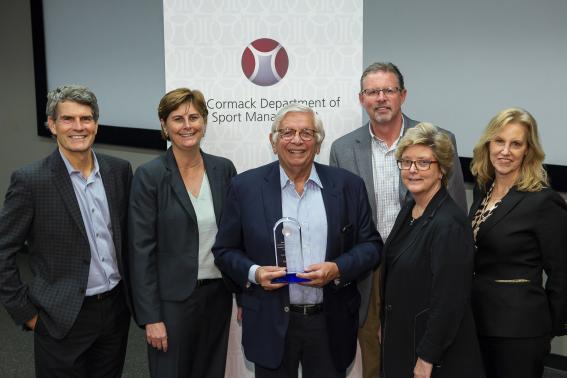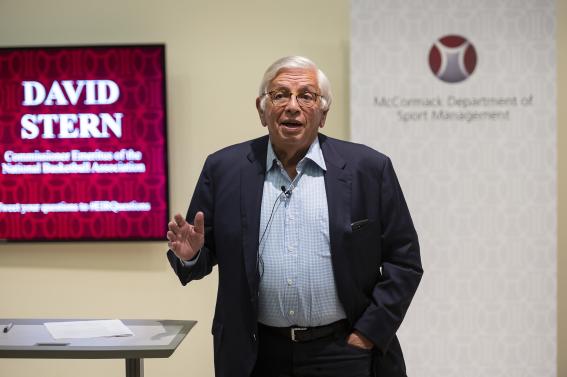David Stern Revisits Three Decades of Innovation in Basketball
October 22, 2019

As commissioner of the NBA for 30 years (1984-2014), Stern reshaped professional basketball by embracing globalism, new technologies, grassroots recruiting, social responsibility, and the Women’s National Basketball Association. On top of delivering his keynote talk, the Commissioner Emeritus spoke in classes, participated in roundtables with McCormack students and faculty, and shared insights with the McCormack Collection Oral History Project.
Three Critical Domains
Stern’s talk focused on three areas: the NBA’s innovation through technology, its emphasis on social responsibility, and its strategy to secure an expanded pool of players through grassroots “activation.” On the technology front, the NBA has been a habitual early adopter, he remarked. That includes cable deals with the USA channel (1979) and a subsequent arrangement with DirecTV that brought the league into 5 million homes. Jumping on the internet bandwagon, the league created NBA.com. And it launched its own network, NBA TV, which initially, Stern said, “nobody watched.” He added, however, that the venture fostered “intellectual growth—not necessarily business growth.”
The league was also ahead of the curve in embracing social media. That included informing the players that their pronouncements might gain wider—sometimes unwanted—currency. Minus a few high-profile hiccups, “our players understood the medium early on,” he recalled. Stern’s protégé and future NBA commissioner Adam Silver insisted that ‘we want to be as distributed as possible.’ “He was right,” Stern affirmed. [Social media] “has been a big part of our growth.”
The NBA has been no less passionate about its commitment to social responsibility, emphasized Stern, who recounted two milestones that profoundly influenced the organization and basketball itself. The first was the revelation in 1991 that one of its high-profile players, the affable Magic Johnson, was HIV positive. “It was a stunner; it was on the front page of every newspaper,” Stern recalled. Johnson, he added, became “the face of AIDS.” His identity with the disease empowered the struggle to overcome its stigma. Embracing that cause, “We viewed Magic’s experience as educational.”

The second milestone, a 1993 visit to South Africa by NBA executives and players, sought to spur development of the sport in that deeply fractious nation. A highlight of the experience: a 45-minute meeting with Nelson Mandela, who recently had been released from Robben Island Prison and was a year away from becoming South Africa’s president. “Meeting with Mandela was life changing,” Stern recalled. It underscored, he said, Mandela’s affirmation—I really do feel that sports can bring people together. To that end, the NBA has long advocated—in Stern’s words—a “single world conversation” on behalf of human rights, the representation of women, and the extinction of racism.
Shifting gears, Stern noted that the league has created new, nontraditional channels to broaden its pool of players. “In the last five years, [those initiatives] have taken off spectacularly,” he observed. NBA academies (including seven outside the U.S. and tournaments like the Jr. NBA Global Championship with Disney) expand the league’s footprint. So does its own minor league feeder—the G-League, which sports 27 teams, many in formerly underrepresented markets. For Stern, the strategy is straightforward—“to develop the next generation of NBA players.”
A Global Game
Basketball is tailor-made for global dissemination, noted Stern in a subsequent interview. “You need less real estate and equipment. You can play in groups, one on one, alone. It’s almost an unfair advantage,” he confessed. With impetus from high-profile advertisers like Coca-Cola, Nike, and Adidas, the NBA’s growth has dovetailed with an increasingly interconnected world economy. “We’re in 200-plus countries, and that includes 43 languages,” he added.
As head of the NBA, Stern became a fixture over his tenure of three decades. The former commissioner explains: “It was always new to me—merchandising, licensing, trading cards, globalization, cable, digital. It was always a big puzzle and I never coasted.”
Stern's visit to the McCormack Department of Sport Management received significant media coverage, including from the following outlets: